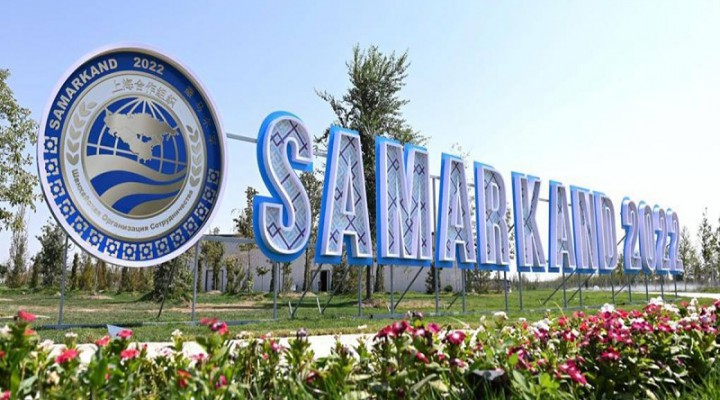The Significance Of The SCO’s Samarkand Summit

Observers have plenty to be optimistic about ahead of this week’s major multipolar event.
The Shanghai Cooperation Organization (SCO) will hold its next summit in the ancient Uzbek city of Samarkand from 15-16 September, which will see the personal attendance of all the group’s leaders. This includes Chinese President Xi Jinping, Russian President Vladimir Putin, and Indian Prime Minister Narendra Modi, whose three countries form the Russia-India-China (RIC) framework that’s regarded as a complementary multipolar platform within the emerging world order.
Uzbek President Shavkat Mirziyoyev published an exclusive opinion piece at bne IntelliNews on Monday previewing the event that his country is hosting. Titled “Samarkand SCO Summit – dialogue and cooperation in an interconnected world”, the Central Asian leader explained that it’s more important than ever to strengthen multilateral institutions at the dawn of this new unpredictable era in international relations. A coordinated unity of purpose is required to stabilize global affairs, he said.
Therein lies the significance of comprehensively strengthening cooperation between the SCO’s members, observers, and dialogue partners. Their combined GDP is equivalent to one-quarter of the world’s total, which is why “the SCO has excellent prospects for transformation and growth through the opening of new strategic prospects – transport and connectivity, energy, food and environmental security, innovation, digital transformation and a green economy”, President Mirziyoyev wrote.
Of particular focus for the SCO is sharing its success story with Afghanistan, to which end he suggested coming together to support the trans-Afghan corridor that was agreed to by his country, that one, and Pakistan in February 2021. The Uzbek leader envisages that its completion will transform Afghanistan’s historical role from a buffer between global powers to a link between Central and South Asia, which will in turn improve connectivity between those two economically dynamic regions.
Samarkand’s location as the site of the SCO’s upcoming summit is symbolic because of its status as “the pearl of the Great Silk Road”. Just like back then, China’s contemporary Silk Road vision of the Belt & Road Initiative (BRI) will once again bring peace and prosperity to the supercontinent. Accordingly, he wrote that “the ‘Samarkand Spirit’ is designed to organically complement the original ‘Shanghai Spirit’, thanks to which more than 20 years ago our countries decided to create a new organisation.”
Viewed from this accurate perspective, observers have plenty to be optimistic about ahead of this week’s major multipolar event. Iran is expected to be admitted as a full member while Belarus’ application for following in its footsteps will likely be welcomed. New dialogue partners Egypt, Qatar, and Saudi Arabia will more closely familiarize themselves with the SCO’s workings, which the UAE is also interested in doing as well. Quick clearly, this group’s win-win vision greatly appeals to West Asia.
That’s extremely significant for everyone to pay attention to since many Western experts hysterically warned that the US’ grand strategic pullback from that region over the past few years in order to simultaneously “contain” China in East Asia and Russia in Eastern Europe would lead to chaos. Far from unfolding in that way, West Asian dynamics have moved in the altogether different direction of comparatively stabilizing after the declining unipolar hegemon’s influence there began to recede.
Those four-mentioned countries’ engagement with the SCO coupled with Turkey’s, which has already been a dialogue partner since 2013, shows that West Asia is eager to embrace the emerging multipolar world order after immensely suffering under the US-led unipolar one since the end of the Cold War. Importantly, the confluence of these multipolar processes in Samarkand is taking place not only at this unique moment in international relations, but also ahead of this year’s UN General Assembly (UNGA).
The first high-level debate will begin on 20 September, just several days after the SCO countries and their leaders meet in Uzbekistan. Considering all that’s expected to be discussed during that time, it’s useful for multipolar countries to coordinate their stance on the world’s most pressing issues in order to counteract the US-led West’s predictable efforts to exploit that global fora for the purpose of desperately trying to divide and rule the world.
With this larger context in mind, the SCO’s Samarkand Summit can be perceived as preserving the spirit of the UN Charter with respect to prioritizing international law, peace, and prosperity in international relations against the West’s plot to undermine all three through its hypocritical so-called “rules-based order” concept. The contrast between these two groups of countries therefore couldn’t be clearer, which is why a growing number of states across the Global South are ditching the West for the SCO.’
 TheAltWorld
TheAltWorld 
0 thoughts on “The Significance Of The SCO’s Samarkand Summit”